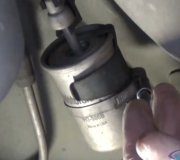All dealerships and many independent shops use a book called the Flat Rate Guide. It spells out exactly how much time to charge for performing specific tasks such as replacing a sensor. Body shops do the same thing, so estimates from different shops should be the same. The only difference will be due to different shop hourly labor rates, additional parts or services, or cost of parts depending on where they were purchased.
The advantage to flat rate is every customer is charged the same amount, AND every mechanic is paid the same amount, (in hours). If due to experience, training, or investing in special tools, he gets the job done faster, he gets paid the same number of hours. If he hurries too much and does something wrong, he gets to fix it or do it over for free.
Think of your neighbor's kid mowing your lawn for ten bucks. It doesn't matter if it takes him all day with a scissors, or two hours with a lawn mower, he earns ten bucks. Would you be angry if he invested in a riding lawn mower and got done in one hour? It's still ten bucks, but he can mow more lawns in a day. A lot of people incorrectly think they got ripped off when they were charged for four hours when their car was done in three hours. They're the same people who complain when they were quoted, (and charged) for four hours, but the job took five.
Thinking you're being charged more than someone else isn't a woman thing, it's an uneducated consumer thing. Guys are just as likely to feel they were over-charged when they don't understand how repair shops and their cars work. Gone are the days when backyard mechanics could do any job a lot cheaper because they didn't have to pay all the taxes, insurances, hazardous material recycling charges, and shop upkeep.
There may be times when someone will be charged less than you because they know more about cars. As an example, you might buy a set of tires, and they notice the old ones had bad tire wear, or your brake pads are almost worn out. It should be easy to convince you to have the additional work done. They are actually looking out for you in the long run while generating more business for themselves. Since the wheels are already off, it will take less extra time to do the brake work.
The next person might know that "almost worn out brakes" could last another 10,000 miles because he drives on the highway a lot, or an alignment might have just been done a month ago. (Alignments should be done with the old tires either installed yet or available for the mechanic to "read" so he knows what adjustments are needed). If the car was recently aligned, that bad tire wear will remain for a long time, so it will be interpreted as needing an alignment if the mechanic doesn't know it was just done.
You might also feel threatened by the "it could fail soon" syndrome. Old, soft radiator hoses could spring a leak. This results in most people sitting on the side of the road in a puddle of tears. People like me know how to safely nurse the vehicle home or perform makeshift repairs on the spot. As a result, I don't replace anything until it's beyond junk! Imagine though how you would feel sitting on the side of the dark country road on a Saturday night with a popped hose and your mechanic did NOT warn you about it.
A lot of shops will inspect your car more carefully and find more things that need attention in an effort to prevent the unexpected breakdown. Consumers who know enough about cars to be dangerous are often penny wise and dollar foolish. Some shops might cater to that person by doing only the repairs requested and no more. Naturally their bill will be lower, but they get what they didn't pay for.
One final thought. It's best to stick with a shop you trust. People who bounce from shop to shop are always convinced the last one ripped them off. Regular customers at the dealership where I worked knew the mechanics by name, and there was less incentive to push additional services now because they knew they would be back in the future. There was no fear of losing that additional work to a competitor. A common saying at my shop was "it takes more advertising dollars to get one new customer that it takes to keep ten current customers happy". When shop personnel know they are likely to keep your business, they are more likely to continue trying to earn it.
Dealerships also keep a history record of your car so they know what work was done in the past. Since they have factory training, many jobs actually take less time. When it comes to a difficult diagnosis, all of their expertise pertains to your car. Mechanics at the better independent shops also seek out a lot of training, but they have to spread it out over every brand and model of car. When comparing them to doctors, dealership mechanics are like the specialists, and independent shops are more like the general practitioner. Both have their place, but don't you normally go back to the same doctor for every checkup? Even if they misdiagnose something once, it doesn't erase all the previous positive visits.
Caradiodoc
SPONSORED LINKS
Wednesday, January 13th, 2010 AT 12:58 AM



